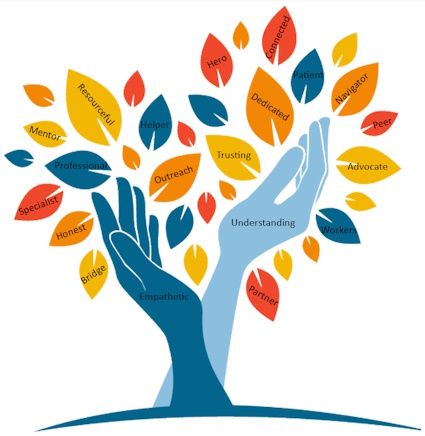THE MECHW INITIATIVE
Who we are
Defining CHWs
A trusted frontline public health professional who applies their unique understanding of the lived experiences, socioeconomic needs, language, and culture of the communities they serve.
A Community Health Worker:
- Acts as a bridge between providers and individuals, to promote health, reduce disparities, and improve service delivery.
- Empathizes with and advocates for individual and community needs.
- Helps to build individual, family and community capacity by increasing health knowledge and self-sufficiency through a range of activities such as outreach, community education, informal counseling, social support, and advocacy.

Impact
CHWs have been working in Maine communities for two decades and today they serve diverse groups across our state. These include:
- Aging adults
- Migrant & seasonal farmworkers
- New Mainers
- Patients with a chronic disease
- Patients with a mental illness and/or substance use disorder
- People experiencing homelessness
- People experiencing poverty and/or food insecurity
- Tribal communities
- Uninsured and publicly insured patients
There is growing recognition and evidence for the use of Community Health Workers (CHWs) in reducing health disparities, improving patient outcomes, and lowering health care costs in Maine and across the country.
There is now a large body of evidence from CHW programs across the United States and the world on the effectiveness of using CHWs across multiple settings and health issues. Rather than attempt to provide our own synopsis, we will point you to organizations that have compiled summaries and databases on the best available research:
- Association of State and Territorial Health Officials (ASTHO) has released briefs on making the case for CHWs
- Centers for Disease Control and Prevention (US CDC) has released a Community Health Worker toolkit that includes policy evidence assessment reports, peer reviewed journal articles, and a literature summary
- CHW Central maintains a resource hub that sources and makes available the global evidence on community health workers, including publications, gray literature, tools, and media
- Community Preventive Services Task Force (CPSTF) recommends interventions that involve CHWs released to cancer screening, cardiovascular disease prevention, diabetes prevention, and diabetes management
- National Association of Community Health Workers (NACHW) maintains a Document Resource Center which archives materials related to certification, sustainable financing, state policy making, and workforce development.
Titles
Community Health Worker is an umbrella term that encompasses individuals in many different positions who have a unique understanding of communities and apply the C3 roles and skills in their position. Examples of alternative titles used in Maine are:
- Community Health Outreach Workers
- Community Services Specialists
- Community Resource Specialists
- Parent Community Specialists
- Peer Navigators
- Patient Navigators
- Promotores de salud (Promotoras)
- Natural Helper
- Community Health Worker (CHW)
- Community Care/Health Navigator
Although CHWs work under different titles, what unites us is a broad knowledge of communities, our ability to serve individuals in non-traditional settings, and the roles and skills that we practice, and our shared qualities (see National Community Health Advisor Study).
For those that work with and support Community Health Workers, it is important to recognize that CHWs have their own distinct professional identify. CHWs are different from social workers, care managers and interpreters because of the training they receive, where they practice, and their relationship to the individuals and communities they serve. We advocate for a better understanding of the CHW role within healthcare and encourage individuals to embrace the CHW title to increase awareness.
CHW Roles & Skills
CHWs are trained to perform a specific set of roles and skills that make them unique among health professionals. We endorse the roles and skills that were developed by the Community Health Worker Core Consensus (C3) Project, which serve as the foundation for professional development and scope of practice. Below is an overview of the C3 roles and core skills. For a full description, please see this check list.
CHW Roles
- Cultural Mediation Among Individuals, Communities, and Health and Social Service Systems
- Providing Culturally Appropriate Health Education and Information
- Care Coordination, Case Management, and System Navigation
- Providing Coaching and Social Support
- Advocating for Individuals and Communities
- Building Individual and Community Capacity
- Providing Direct Service
- Implementing Individual and Community Assessments
- Conducting Outreach
- Participating in Evaluation and Research
CHW Core Skills
- Communication Skills
- Interpersonal and Relationship-Building Skills
- Service Coordination and Navigation Skills
- Capacity Building Skills
- Advocacy Skills
- Education and Facilitation Skills
- Individual and Community Assessment Skills
- Outreach Skills
- Professional Skills and Conduct
- Evaluation and Research Skills
- Knowledge Base
